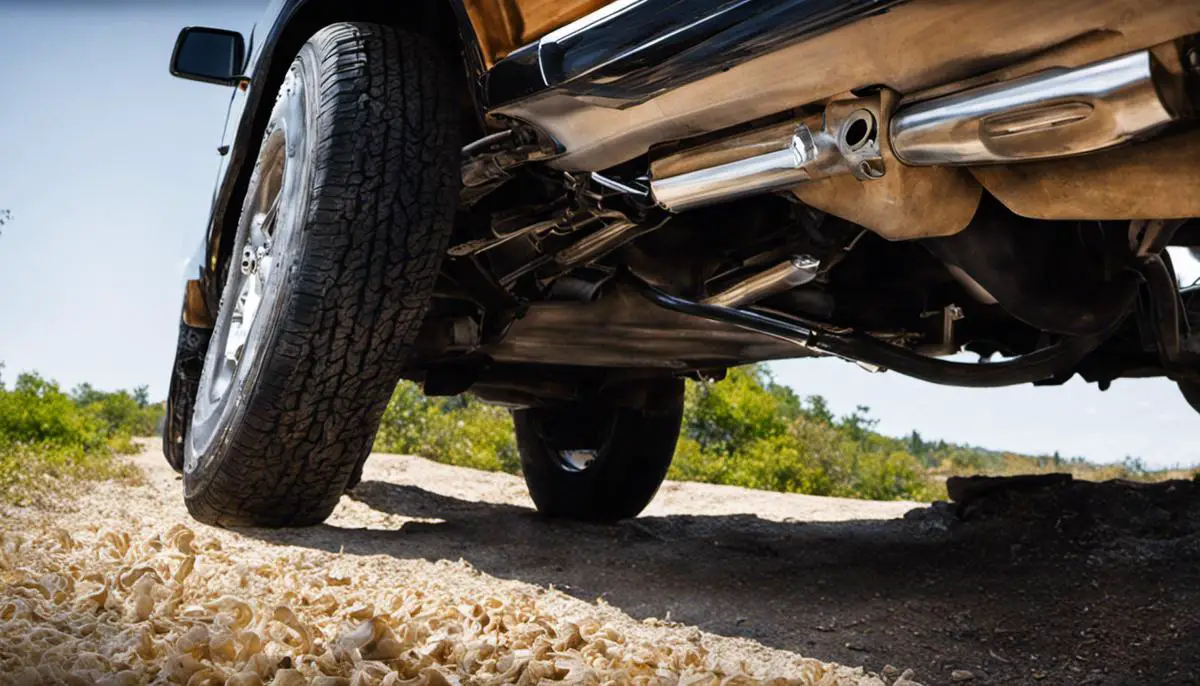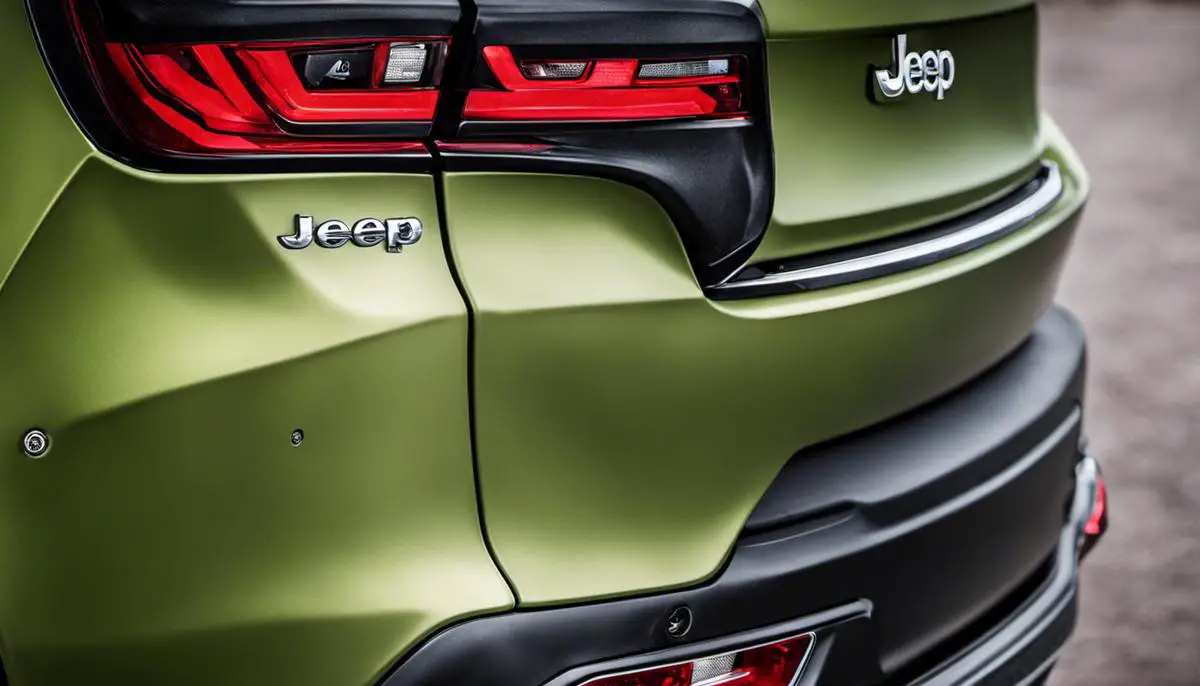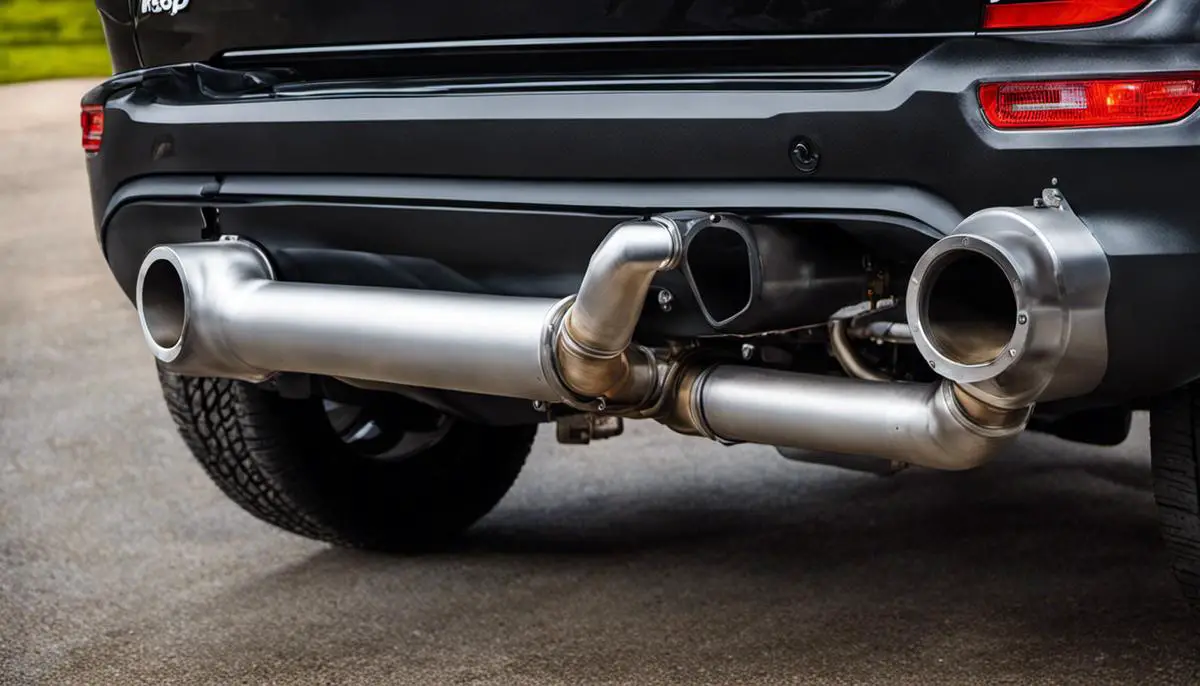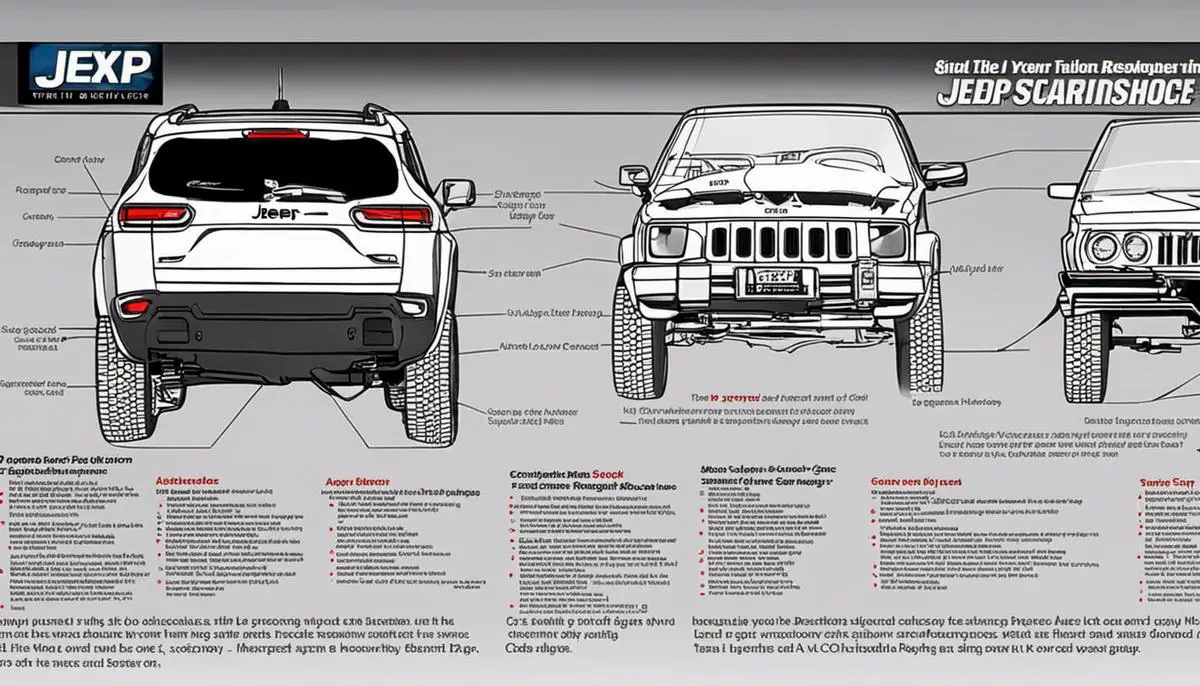Understanding the 2001 Jeep Cherokee Exhaust System: An Essential Guide

Last Updated on September 29, 2023 by Christ
Understanding the intricate workings of the exhaustion system of the 2001 Jeep Cherokee can be immensely valuable for car owners, mechanics, and enthusiasts alike. Taking a deep dive into this vehicle’s exhaust system not only enlightens us about its critical components but also sheds light on its value in ensuring optimal performance and fuel efficiency. The exhaust system is often underestimated and overlooked, yet it plays an integral role in the vehicle’s overall health. This discussion encompasses the basic overview, common problems and their symptoms, important maintenance measures, and the process of replacing this exhaust system. By gaining a comprehensive understanding of these topics, we will be better equipped to recognize, troubleshoot, and even prevent common exhaust system issues.
Contents
Overview of the 2001 Jeep Cherokee Exhaust System
The 2001 Jeep Cherokee exhaust system
The 2001 Jeep Cherokee exhaust system is a crucial part of the vehicle, responsible for carrying away the by-products of combustion from the engine, reducing noise produced by the exhaust gases, and ensuring optimal performance through complete combustion. This system not only keeps the vehicle running smoothly and quietly but also helps maintain a clean and safe environment by reducing harmful emissions.
Jeep Cherokee Exhaust System Components
The 2001 Jeep Cherokee’s exhaust system consists of several components, each with a specific function. At the forefront, the exhaust manifold collects the gases produced during the combustion process. Made from cast iron or stainless steel, it has individual tubes for each cylinder, allowing these gases to flow smoothly into the subsequent part of the system.
The oxygen sensor, found within the manifold, is a device that monitors the level of oxygen in the exhaust gases. The data it gathers is sent to the engine control unit (ECU), which uses this information to adjust the air-fuel mixture for combustion. This ensures optimal engine performance and reduces harmful emissions.
Connected to the exhaust manifold is the catalytic converter, a component that plays a critical role in reducing harmful emissions. Through a chemical reaction, the catalytic converter turns harmful gases into less harmful substances.
Down the line, the muffler reduces the noise produced by the exhaust gases. The interior of a muffler features baffles and chambers designed to diminish the noise created by the release of the gases.
Finally, the tailpipe, also known as the exhaust pipe, is the last piece of the exhaust system. This part guides the gases safely out of the vehicle and away from the passenger cabin.
2001 Jeep Cherokee Exhaust System Functionality
Each component of the exhaust system plays a part to optimize the performance and emissions of the 2001 Jeep Cherokee. The exhaust manifold gathers and directs the gases into the catalytic converter, where they undergo a chemical transformation to reduce their harmful effects.
The oxygen sensors constantly monitor and relay information about the exhaust’s oxygen content back to the ECU. If the sensors detect too much or too little oxygen, the ECU modifies the air-fuel mixture to ensure ideal combustion and limit pollutant emission levels.
Further down the system, the muffler works to reduce engine noise, making the vehicle’s operation smoother and less disruptive. Finally, the tailpipe directs the treated gases outside, away from the vehicle’s interior and passengers.
The Necessity and Impact of Regular Maintenance of the 2001 Jeep Cherokee Exhaust System
In the grand scheme of a 2001 Jeep Cherokee’s functioning, each part of the exhaust system carries its own weight. This is clearly seen in how the exhaust system is responsible for maintaining power delivery, managing noise levels, and ensuring emission outputs stay compliant with federal and local laws. Regularly inspecting and maintaining this system contributes to the vehicle’s longevity, while simultaneously promoting safer and more eco-friendly operation.

Common Problems & Symptoms
Potential Problems Experienced by the 2001 Jeep Cherokee Exhaust System
Despite the robust construction of the 2001 Jeep Cherokee, the exhaust system is not exempt from common wear and tear issues. Chief among these is rust damage, an issue exacerbated by environmental factors like road salt and atmospheric moisture. Over time, rust formation can lead to noticeable weak spots that can subsequently lead to cracks and potential leaks within the system.
In addition to this, exhaust leaks are a commonly experienced issue with this model. Predominantly arising at the seams or joints where different sections of the system meet, these leaks can negatively impact both the vehicle’s performance and fuel economy. Not only does this result in an increase in fuel consumption but can also contribute to the release of harmful pollutants into the atmosphere.
Symptoms to Look for
The 2001 Jeep Cherokee is equipped with numerous sensors that monitor the functioning of the exhaust system. If the system starts to fail, the vehicle’s check engine light may illuminate on the dashboard. This is often the first sign that something may be wrong with your exhaust system.
Unusual noises, such as hissing, rattling, or roaring, can also hint at problems in the system. A hole in the muffler or a leak in the exhaust pipe can create these noises. Reduced engine performance, including lower power or acceleration, might signify a clogged or misaligned exhaust system.
One more warning sign is the distinct odor of exhaust fumes inside the cabin. This could indicate a leak in the exhaust system, possibly near the engine or in the heating system, and should be addressed immediately as it could pose a health risk to the passengers.
Impact on Vehicle Performance
The exhaust system plays a vital role in a vehicle’s overall performance, safety, and environmental impact. It’s responsible for safely venting exhaust gases from the engine to the rear of the vehicle and reducing harmful emissions.
In the case of the 2001 Jeep Cherokee, if the exhaust system becomes damaged or malfunctions, the vehicle could experience a reduction in performance. One of the most obvious signs of a malfunctioning exhaust system is decreased fuel efficiency. This occurs because the vehicle’s engine has to work harder when the exhaust system isn’t properly venting gases.
Furthermore, a damaged exhaust system can produce higher levels of harmful emissions. This not only impacts the environment but can also result in failing an emissions test – which is required for vehicle registration in many US states.
In essence, maintaining the health of your 2001 Jeep Cherokee exhaust system is critical to ensuring your vehicle runs efficiently, stays eco-friendly, and remains safe for all passengers. Regular inspections and timely repairs are key to a long-lasting and optimally performing exhaust system.
Proactive Maintenance and Repair of Exhaust System
To stave off potential issues with your 2001 Jeep Cherokee’s exhaust system, recurring and thorough check-ups along with necessary maintenance work should be your priority. This can involve inspecting the system for signs of rust or holes and replacing damaged parts without delay. Most problems can be solved with straightforward repairs, such as fixing leaks or tightening loose fittings. In more severe situations though, a full replacement of the system might be needed.
When handling the exhaust system repairs or replacements, it’s highly recommended to use high-grade, fitting parts. This ensures durable repairs and the overall wellbeing of your exhaust system. Further, obtaining a professional assessment from a certified mechanic can guide you towards more informed decisions about your vehicle’s upkeep.
In view of these factors, staying alert and proactive about your Jeep Cherokee’s exhaust system’s condition is a surefire way to warrant its durability and operational performance. Understanding the common issues, detecting early warning signs, and being aware of the potential impact on your vehicle’s functioning can enable proficient upkeep of your vehicle, making your journey more enjoyable and untroubled.

Maintenance & Troubleshooting
An Insight into the 2001 Jeep Cherokee Exhaust System
The exhaust system deployed in the 2001 Jeep Cherokee SUV is a fundamental component with key roles in the vehicle’s comprehensive performance. Its function ranges from channeling exhaust gases from the engine towards the rear of the vehicle, minimizing the quantity of harmful emissions, dampening the noise generated by high-speed exhaust gases, to enhancing the engine’s performance by controlling the back pressure ratio. This multi-dimensional role highlights the inherent importance of the exhaust system in the overall scheme of the vehicle’s design and functioning.
Exhaust System Components
Key parts that make up the 2001 Jeep Cherokee exhaust system are manifold, oxygen sensors, catalytic converter, muffler, and tail pipe. The manifold collects exhaust gases from each cylinder, which then passes through the oxygen sensors. The catalytic converter further breaks down harmful gases into less damaging substances, while the muffler reduces engine noise. Lastly, the exhaust gases exit the vehicle via the tail pipe.
Maintenance of the 2001 Jeep Cherokee Exhaust System
Regular examination of the exhaust system is essential to maintain the smooth operation of your 2001 Jeep Cherokee. A visual check of the system could be carried out during routine oil changes. Specifically, it is crucial to watch out for rusts which is the primary enemy of exhaust systems, excessive soot from the tailpipe, signifying incomplete burning of fuel and holes in the exhaust which could contribute to inefficient running and increased engine noise.
Troubleshooting Tips
Several indicators could show signs of a troublesome exhaust system. These may include a noticeable decrease in fuel efficiency, an increase in engine noise or a rotten egg smell indicating a failing catalytic converter. If a loud roaring sound is heard, it could be due to a hole or crack in the exhaust’s pipe, muffler, or catalytic converter.
Common Issues and Preventive Measures
One common problem with the 2001 Jeep Cherokee exhaust system is rust. This can be minimized through regular cleaning, especially during winter months when there are possibilities of salt exposure, which hastens rusting. Another common issue is a failed oxygen sensor, which could lead to reduced fuel economy. To avoid this, regular checks should be done and replacements done when required.
Exhaust leaks could occur due to holes in the system or loose connections. If detected early, the hole could be patched, or a new part of the system installed to replace the damaged one. To avoid such problems, it is recommended to use high-quality components during system replacement and ensure properly sealed connections.
The catalytic converter, a key component, can become clogged with carbon deposits, leading to reduced performance and failure to pass emissions testing. To prevent this, monitoring the condition of the spark plugs and keeping the engine properly tuned is recommended.
It is key to acknowledge the importance of the exhaust system in your 2001 Jeep Cherokee. Regularly observing and maintaining this integral component has profound implications on the efficient running and life span of your vehicle. The exhaust system can be considered as a measure of your vehicle’s performance, thereby warranting consistent check-ups, timely repairs, and replacements when necessary.

Replacing the Exhaust System
How to Recognize the Need for a Replacement
Undeniably, the exhaust system of a 2001 Jeep Cherokee plays a crucial role in numerous operations including but not limited to controlling exhaust emissions and noise, and preserving ideal fuel efficiency. Hence it’s essential to know when a replacement is needed. Signs indicating a compromised exhaust system could range from a noticeable increase in engine noise, a decrease in power and acceleration, an unusual burning smell originating from the engine compartment, significantly reduced fuel efficiency, or even physical signs such as leakage or rust. Upon noticing these symptoms, it may be time to consider a replacement.
Understanding Replacement Costs
The cost to replace an exhaust system can vary greatly depending on the specific parts that need replacement. In general, it can range anywhere from $300 to more than $1000. The price factors in parts, labor, and potential additional costs for other related components that may need to be replaced like hangers or gaskets. It is essential to get a comprehensive quote before proceeding with a replacement to avoid unexpected costs.
Replacement Process
The exhaust system replacement process for a 2001 Jeep Cherokee can be a complex task, especially for individuals without substantial automotive knowledge. The old, faulty exhaust system must be detached first, which often involves loosening rusted-on bolts and clamps. After the old system is removed, the new exhaust system can be installed. This typically involves securing the exhaust manifold to the engine, attaching the pipes to the manifold and rear of the vehicle, and securing the muffler to the pipes. The final step is connecting the tailpipe to the muffler.
Finding Quality Replacement Parts
Quality parts are integral to a long-lasting exhaust system. Look for components that are made for your specific Jeep model to ensure a proper fit. Brands like Magnaflow, Flowmaster, and Borla are highly reputable and specialize in exhaust systems. Parts made from stainless steel or aluminized steel are recommended due to their resistance to rust and corrosion.
Key Considerations
While replacing the exhaust system, it might be a good time to consider any upgrades or modifications. Performance exhaust systems can boost horsepower, improve fuel efficiency, and even give your Jeep a robust, aggressive sound. However, remember that any modifications should comply with your local emission standards.
In conclusion
Replacing the exhaust system in a 2001 Jeep Cherokee requires understanding the symptoms of a failing system, the associated costs, and the installation process. Furthermore, knowing how to find quality replacement parts and considering any desired upgrades is key to ensuring a successful replacement.

Through the journey of this detailed exploration, we’ve captured the essence of the 2001 Jeep Cherokee’s exhaust system. A thorough grasp of these key aspects allows us to ensure the longevity and reliability of our vehicles, by acknowledging the signs of complications and acting promptly to resolve them. The knowledge of the replacement process serves as a guiding light when faced with the inevitable wear and tear long-standing vehicle ownership brings. Indeed, the power to maintain and optimize the exhaust system’s performance directly correlates with our understanding of it. Through diligent maintenance and a proactive response to potential problems, we can savor the 2001 Jeep Cherokee’s outstanding performance for many years to come.
Leave a Reply